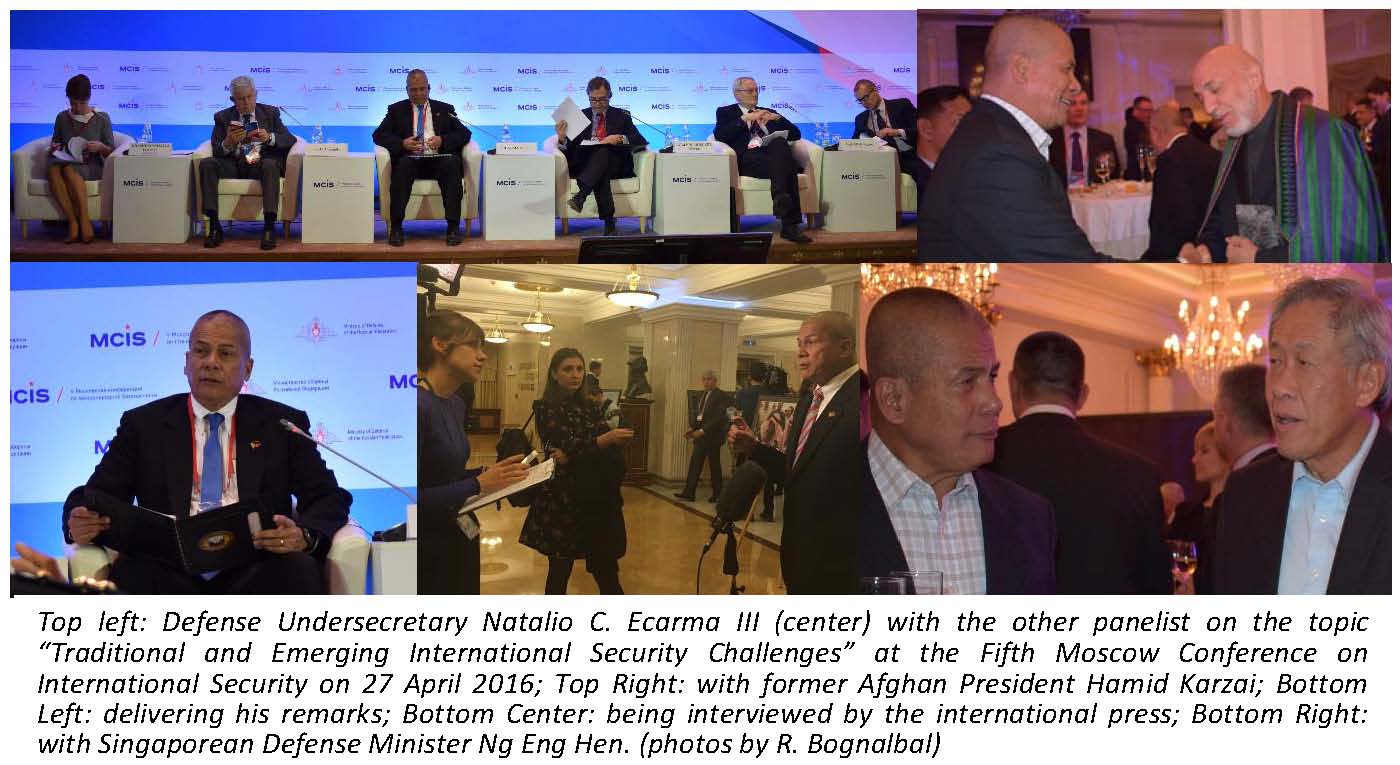
02 May 2016 - Defense Undersecretary Natalio C. Ecarma III highlighted the international security concerns of the Philippines, particularly given Asia’s emergence as a politico-economic powerhouse.
“Asia’s rise is generating tectonic shifts in the regional security environment. This in turn is posing new security challenges, while complicating long-standing issues – both traditional and non-traditional,” Undersecretary Ecarma told the gathered officials.
To address these challenges, he said that “the key is dialogue between and among the countries.”
According to the Undersecretary, for East Asia, this must be “with a view to clarifying perceptions and views on regional security developments” and be done “through ASEAN and ASEAN-led mechanisms such as the East Asia Summit, ASEAN Defense Ministers’ Meeting Plus, and the ASEAN Regional Forum.”
Undersecretary Ecarma is in Moscow to represent Defense Secretary Voltaire T. Gazmin at the Fifth Moscow Conference on International Security (MCIS). Over 500 participants, including top defense and military officials and experts from other countries are in Moscow for the Conference, which is held annually since 2012 under the auspices of the Russian Defense Ministry.
On specific security concerns, Undersecretary Ecarma pointed to the disputes in the West Philippines Sea/South China Sea and stressed“the Philippines is for peaceful settlement . . . based on international law.”
“In 2013, we decided to bring the issueto international arbitration after exhausting all reasonable means, including at the bilateral level. Arbitration is a friendly and judicious act that could pave way for a durable and rules-based solution to the problem,” he added.
Another major security concern, according to Undersecretary Ecarma, are natural disasters.
“In 2013, the Philippines was struck by Haiyan – the strongest tropical typhoon ever recorded in human history.” He pointed out that “international responses had to be well-coordinated” and that by employing the United Nation’s cluster approach, humanitarian actors, national and local authorities, and civil society were able to work together efficiently.
“We remember the outpouring of support from the international community and we remain grateful for that,” the Undersecretary added.
Another significant security threat is terrorism, which according to Undersecretary Ecarma must be addressed by engaging civil society organizations “because we recognize that the military and law enforcement approach is only but a part of the needed comprehensive strategy.”
“CSOs, given their direct and strong links to local communities, are valuable partners in curtailing radicalism and addressing the roots of extremism,” Undersecretary Ecarma pointed out.
Cyber security, according to the Undersecretary, is another important concern. “Trends show that cyber portals are being utilized by extremists to recruit members. It is therefore imperative for us pursue cooperative initiatives aimed at enhancing our capacity to secure confidential computer data systems from unauthorized access and data leakage, among others,” he said.
The Undersecretary characterized these issues as complex and transboundary in nature and said that to address these the Philippines is “committed to building new partnerships and strengthening existing ones in the interest of peace and security for all.”
Undersecretary Ecarma expressed support for the Conference, saying “This annual conference – now on its 5th year – is indeed a good platform for exchanging views on security challenges among national defense establishments. The Department of National Defense of the Philippines is a firm believer in dialogue outside the usual official channels such as the MCIS.” END.

